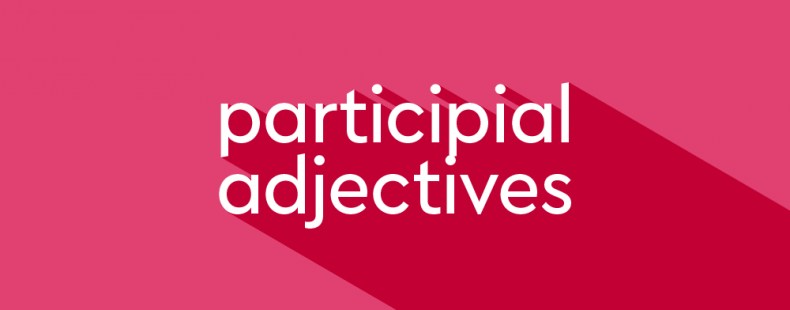In grammar, we use adjectives to modify and describe nouns and pronouns. The words funny and blue are examples of adjectives. We also use participles to create some of the different verb tenses. The words jumping and tangled are examples of participles. Sometimes, though, the participles don’t want to be left out of the modifying fun and decide to act as adjectives. There’s a fun participle in this sentence: The pirates found buried treasure. When participles decide to join in the adjectival adventures, we refer to this type of adjective as a participial adjective.
Although they may look a bit odd, participial adjectives are perfectly capable of acting as adjectives in our sentences.

What is a participial adjective?
A participial adjective is an adjective that is identical in form to a participle. Before you learn more about participial adjectives, it would be a good idea to review both past and present participles. In short, participles are words that usually end in -ed or -ing and derive from verbs. However, there are many irregular participles that don’t have these endings, such as grown, hidden, and broken.
A participial adjective simply takes a participle and uses it as an adjective. For example:
- I put on my running shoes.
- She was really tired.
Although participial adjectives look a little weird, they behave the same as any other adjective. They are used to modify and describe nouns and pronouns. While it depends on the word, participial adjectives often describe something’s state or condition (excited, depressed, confused, etc.) or say that something is related to a certain action or activity (cooking class, boxing gloves, reading glasses, etc.).
Types of participial adjectives
Both past participles and present participles are used as participial adjectives.
Past participles as participial adjectives
There are many participial adjectives formed from past participles. For regular verbs, adding -ed to the base form creates the past participle. The following list gives just some examples:
- awakened, burnt, crushed, destroyed, enhanced, frozen, glazed, heated, iced, jinxed, kept, licensed, mangled, notched, opened, pickled, quilted, rented, silenced, televised, unleashed, vaccinated, whispered, yelled, zapped
Present participles as participial adjectives
Lots of present participles are used as participle adjectives, too. Adding -ing to the base form of a verb creates the present participle.
- answering, boring, caring, daring, entertaining, freezing, guessing, hiding, itching, jutting, kissing, listening, moving, nursing, pleasing, quivering, rustling, smiling, tantalizing, unloading, visiting, waiting, yodeling, zooming
Don’t confuse present participles with gerunds! Learn more about gerunds here.
Where to include a participial adjective in a sentence
Like most other adjectives, participial adjectives can be used directly before the nouns or pronouns they modify or used as the subject complement of a sentence with a linking verb.
- He is taking his driving test today.
- She was scared.
Participial adjective examples in a sentence
Each of the following example sentences uses a participial adjective, written in bold.
Example #1
- Teresa bought her niece a coloring book. (The participial adjective coloring modifies the word book; it indicates that the book is intended to be colored on.)
Example #2
- The math class was incredibly boring. (The participial adjective boring is the subject complement that describes the math class. The sentence says that the math class bored the students.)
Example #3
- He fixed the broken radio. (The participle adjective broken describes the noun radio; the radio had been broken by someone or something.)
Participial adjective rules & best practices
While participial adjectives look a bit different, they act the same as any other adjective. This means that, like other adjectives, they can be turned into comparative and superlative adjectives. Because most participial adjectives are longer words, they usually are preceded by the words more, less, most, and least when made into comparative or superlative adjectives.
- The Destroyer is the most exciting roller coaster in the park.
- The relish was the least used topping at the barbeque.
- I am less daring than my sister is.
- The second witness was more convincing than the first.
Because they are adjectives, participial adjectives can only modify nouns or pronouns. They cannot be used as subjects, objects, or as verbs.
Review the facts about nouns here, including the many types there are.
Because they are identical to participles, it is easy to confuse participial adjectives with other parts of speech. Remember, adjectives are used to modify and describe nouns and pronouns. If a word is doing something else in a sentence, it is not a participial adjective. For example:
- Participial adjective: Todd was late for his swimming lesson. (Swimming is a participial adjective that describes the noun lesson.)
- Present participle: Patrick has been swimming in the lake for hours. (Swimming is a present participle that is being used as a verb in the present perfect continuous tense.)
- Gerund: Swimming is allowed at the beach. (Swimming is a gerund that is used as the subject of the sentence. This sentence also has a participial adjective allowed used as the subject complement.)
- Participial adjective: She tried to guess the deleted words. (Deleted is a participial adjective describing the noun words.)
- Past participle: Many words had been deleted. (Deleted is a past participle used as a verb in the past perfect continuous tense.)
- Past tense verb: The editor deleted many unnecessary words. (Deleted is the past tense verb form of the verb delete.)
We think you’ll agree: you need Grammar Coach!
Confused about participles? Check your writing on Thesaurus.com’s Grammar Coach™. This writing tool uses machine learning technology uniquely designed to catch grammar and spelling errors. Its Synonym Swap will find the best nouns, adjectives, and more to help say what you really mean, guiding you toward clearer, stronger, writing.














